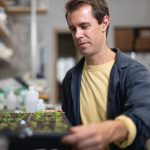Despite only accounting for about 1 percent of skin cancers, melanoma causes the majority of skin cancer-related deaths. While treatments for this serious disease do exist, these drugs can vary in effectiveness depending on the individual. A study by Professor Marc Montminy and Staff Scientist Jelena Ostojić reveals new insights about a protein called CRTC3, a genetic switch that could potentially be targeted to develop new treatments for melanoma by keeping the switch turned off.
Featured Stories
 What’s next for GLPs? Salk scientists are shaping the future of weight-loss medicineSalk researchers are breaking metabolism down piece by piece. Their recent discoveries could help reduce the side effects of GLP-1 drugs and inspire the next generation of weight management therapies.
What’s next for GLPs? Salk scientists are shaping the future of weight-loss medicineSalk researchers are breaking metabolism down piece by piece. Their recent discoveries could help reduce the side effects of GLP-1 drugs and inspire the next generation of weight management therapies. Science comes alive for high schoolers and educators at SalkSalk’s annual High School Science Day had the highest participation in the event’s history, as 205 excited students were welcomed onto campus. Teachers also had a day of their own at the Ellen Potter Teacher Symposium, learning side-by-side with world-renowned scientists.
Science comes alive for high schoolers and educators at SalkSalk’s annual High School Science Day had the highest participation in the event’s history, as 205 excited students were welcomed onto campus. Teachers also had a day of their own at the Ellen Potter Teacher Symposium, learning side-by-side with world-renowned scientists. Nicola Allen: Neuroscience has a new starAs her recent promotion and awards reflect, Allen has led a paradigm shift in neuroscience by turning the field's spotlight onto astrocytes. These specialized brain cells could be the missing piece to understanding Alzheimer's and other neurological diseases.
Nicola Allen: Neuroscience has a new starAs her recent promotion and awards reflect, Allen has led a paradigm shift in neuroscience by turning the field's spotlight onto astrocytes. These specialized brain cells could be the missing piece to understanding Alzheimer's and other neurological diseases. Michelle Chamberlain: Bringing together communities old and newChamberlain, whose lifelong commitment to others has shaped her journey to Salk, now serves as Salk’s vice president of External Relations, leading fundraising, communications, community engagement, foundation relations, and stewardship efforts.
Michelle Chamberlain: Bringing together communities old and newChamberlain, whose lifelong commitment to others has shaped her journey to Salk, now serves as Salk’s vice president of External Relations, leading fundraising, communications, community engagement, foundation relations, and stewardship efforts. Joseph Swift: Saving potatoes, one road trip at a timeSwift, a plant biologist and startup co-founder, had an adventurous upbringing in Australia filled with natural beauty. Today, he uses plant genomics to tackle urgent questions in sustainability and agriculture.
Joseph Swift: Saving potatoes, one road trip at a timeSwift, a plant biologist and startup co-founder, had an adventurous upbringing in Australia filled with natural beauty. Today, he uses plant genomics to tackle urgent questions in sustainability and agriculture.





















































